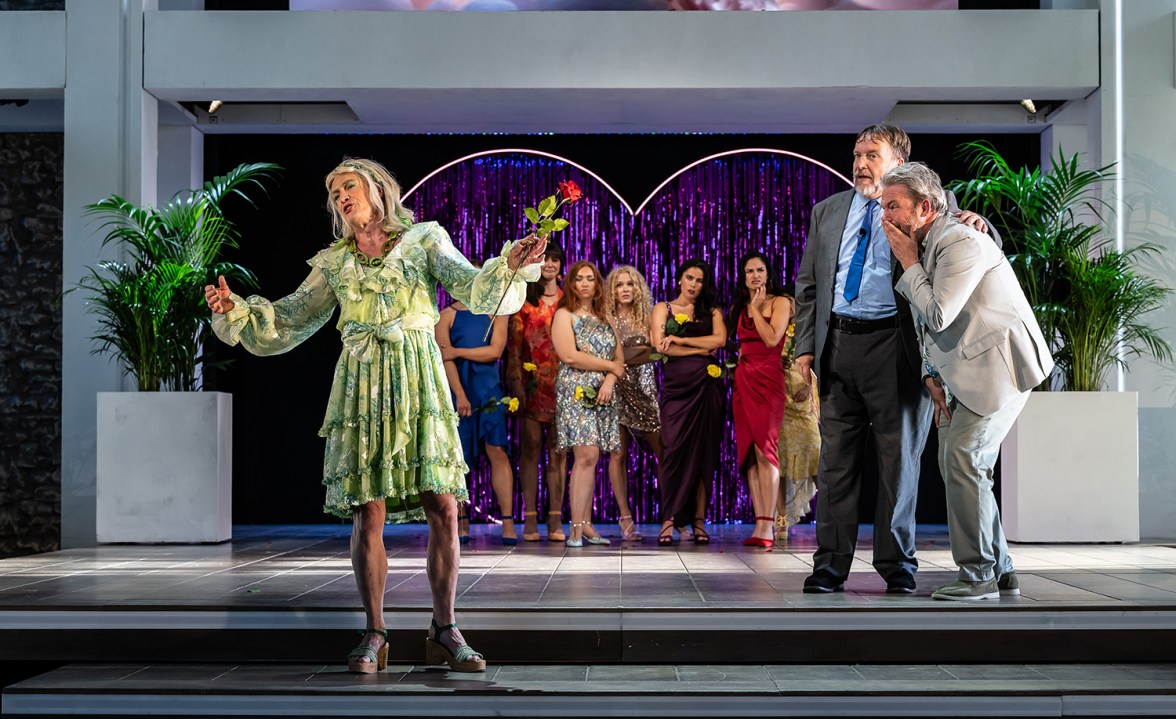Fast times on Mount Olympus. Jupiter has been shagging around again and now his wife Juno has bailed on their hit reality show Jupiter & Juno, storming off set in a thundercloud of gold lamé and wheeled luggage. The producers are freaking out. Production runners scamper in all directions until Bacchus sends out to Starbucks and they all sit down to brainstorm a route out of ratings Hades. Meanwhile the luxury villa lies silent, its jacuzzi empty and the fake grass scattered with cardboard coffee trays. Cupid, it turns out, might have a plan – she knows a wannabe called Platée and, hilariously, she’s a total minger.
Garsington’s new Platée is Greco-Roman mythology restaged as Celebrity Love Island
And that’s just the prologue. We haven’t even reached Act One of Garsington’s new production of Rameau’s Platée, but you get the picture. It’s Greco-Roman mythology restaged as Celebrity Love Island, and this being Garsington, Louisa Muller’s production drips with bling. Fair enough. This is an opera by Rameau: you’ve got to make it work somehow. Rameau’s one-time collaborator Voltaire thought Platée ‘the most detestable spectacle I have ever seen or heard’. Of course, Voltaire didn’t much rate Shakespeare either.
The problem with Platée is real enough, though. Musicians tend to fall in love with the exuberant, bubbling fantasy of Rameau’s scores, so wholly unlike anything in the Italian or German tradition. It’s left to the director to do something about the acres of ballet sequences and masque-like interludes that 18th-century French audiences apparently preferred to character development – you know, stuff like that. (The 19th century wasn’t much better. This was the public that forced Wagner to insert a ballet into Tannhäuser and insisted upon a chorus of dancing witches in Verdi’s Macbeth).
Anyway, here we are in 2024 and there’s no denying that Muller and her company have gone all-in. The set is lavish, the video-projected title sequence for Jupiter & Juno is amusingly ludicrous and a team of ripped and toned dancers gyrate and thrust throughout: a cheese-topped meat feast of tanned thighs and waxed chests. In the words of Nigel Tufnel, what’s wrong with being sexy? Mireille Asselin is La Folie (most of the characters are either deities or abstract concepts, which rather limits the scope for sympathy), a pop starlet who descends from the heavens to play a baroque DJ set before throwing off her puffa jacket to dominate the second half of the show in a slinky little silver number.
Asselin’s singing was supple and bright, if not exactly super-powered. Pretty much the same applied across the (endlessly game) cast, with the notable exception of Ossian Huskinson, as Jupiter – easily the grandest and richest-sounding presence on stage, which was exactly as it should be. I mean, he’s Jupiter. The upwardly-mobile bog-nymph Platée is played (as Rameau intended) by a tenor, and Samuel Boden somehow managed to be both endearingly goofy and insufferably smug, which again, seemed about right. Boden threw himself headfirst at the role, appearing in a series of eye-poppingly daft costumes, walking (literally) on his hands and giving cheerful voice to Rameau’s assorted croaks and quacks.
There might perhaps have been potential there for a bit of a sting in the tail – an element of pathos as the gods’ casual cruelty is exposed. There’s unquestionably a darkness to be explored in the subject of reality TV (remember Jade Goody?) Possibly Muller took a good look at Platée and concluded that it wasn’t a sufficiently robust vehicle with which to make the attempt, and I’d be inclined to agree. But not everything has to be serious, less still kind, and again, the musos do have a point. Rameau’s score is a riot. The choral singing was as lithe as the dancing and the English Concert under Paul Agnew launched itself with enormous bounce and vim at all the bird effects, dissonances and chromatic slithers. It’s a shiny, raunchy, heartless spectacular: perfect Friday night viewing, in other words. Crack open the champers and veg out.
There was a gala atmosphere at Covent Garden, too, on the first night of Antonio Pappano’s final production as music director. Jonas Kaufmann was presumably the main reason for reviving David McVicar’s sumptuous and only slightly creaky 2015 staging of Giordano’s Andrea Chénier, in which he sang the title role. Sondra Radvanovsky played opposite him as Maddalena.
This isn’t the moment to explore reservations about the condition of Kaufmann’s voice, or bemoan the number of times that the cast broke character, opened their arms and belted straight at the auditorium. It’s more important to say that as Gérard, the magnificent Mongolian baritone Amartuvshin Enkhbat practically stole the show – which, with these co-stars, is saying something. This was a festive night, with high octane singing, lavish production values and wide-eyed Technicolor from Pappano and the orchestra. The audience went wild, repeatedly.








Comments